| Srl | Item |
| 1 |
ID:
127550


|
|
|
| 2 |
ID:
112452
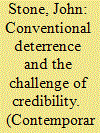

|
|
|
|
|
| Publication |
2012.
|
| Summary/Abstract |
The concept of 'credibility' is a central component of deterrence theory. In this article, credibility is used as a lens through which to examine the effectiveness of conventional force as a deterrent. An advantage that conventional force enjoys over its nuclear counterpart is that it can be used with much greater discrimination. Conventional threats can, therefore, be considered more politically credible than nuclear threats under all but the most extreme circumstances. Conversely, the relatively modest power of conventional weapons renders their effects 'interpretable' to a problematic degree by potential aggressors. Thus, such threats are less likely to be as technically credible as their nuclear equivalents. A range of communicative efforts may serve to reduce the scope for interpreting the effects possible to conventional weapons, although efforts of this kind risk being hampered by cultural obstacles. In consequence, success with conventional deterrence will turn on the ability to identify the specific technical and cultural conditions under which credible threats can readily be made.
|
|
|
|
|
|
|
|
|
|
|
|
|
|
|
|
| 3 |
ID:
161920
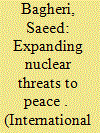

|
|
|
| 4 |
ID:
171551
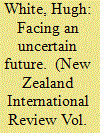

|
|
|
|
|
| Summary/Abstract |
Hugh White discusses the choices Australia faces in defence provision and what they mean for New Zealand.
|
|
|
|
|
|
|
|
|
|
|
|
|
|
|
|
| 5 |
ID:
094126
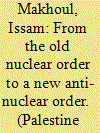

|
|
|
| 6 |
ID:
128924


|
|
|
| 7 |
ID:
023013
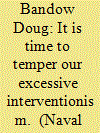

|
|
|
|
|
| Publication |
Autumn 2002.
|
| Description |
76-82
|
|
|
|
|
|
|
|
|
|
|
|
|
|
|
|
| 8 |
ID:
156411
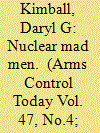

|
|
|
| 9 |
ID:
155583
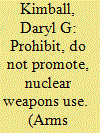

|
|
|
|
|
| Summary/Abstract |
At an emergency UN Security Council briefing on Sept. 4 following North Korea's sixth and largest nuclear test explosion, Nikki Haley, U.S. ambassador to the United Nations, lectured Pyongyang's leaders that "being a nuclear power is not about using those terrible weapons to threaten others. Nuclear powers understand their responsibilities.
|
|
|
|
|
|
|
|
|
|
|
|
|
|
|
|
| 10 |
ID:
140579


|
|
|
|
|
| Summary/Abstract |
IN RECENT DECADES, globalization processes have affected many spheres of human activity, including the nuclear sphere. Under the impact of globalization, the previously divided world, with nuclear weapons and nuclear technology, has transformed and turned into a global system of nuclear dependent states and non-state entities, with systemic properties such as the stability of international nuclear relations, resistance to the impact of destructive factors, nuclear security, and the solidarity of states in addressing global and regional nuclear problems. This global sociopolitical system is known as the "nuclear world."
|
|
|
|
|
|
|
|
|
|
|
|
|
|
|
|
| 11 |
ID:
132011
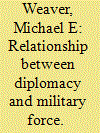

|
|
|
|
|
| Publication |
2014.
|
| Summary/Abstract |
Diplomacy and military force mutually support each other as instruments of national policy, functioning better in concert rather than as separate entities. The Cuban Missile Crisis is a useful case study of policymakers utilizing force and diplomacy synergistically. State Department efforts prior to the crisis paved the way for a unified front with Latin American neighbors against the emplacement of Soviet missiles in Cuba. With a backdrop of nuclear threats supporting the more usable capabilities of conventional air strikes, invasion forces, and blockading ships, the American threat of force made a negotiated settlement attractive to the leadership of the Soviet Union. The risks and political damage commensurate with the use of force encouraged the Kennedy administration to pursue a diplomatic solution. Military leaders tended to not consider the political effects of the use of force. President Kennedy understood the interrelationships between force and diplomacy, as did State Department leaders.
|
|
|
|
|
|
|
|
|
|
|
|
|
|
|
|
| 12 |
ID:
176969
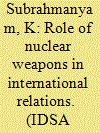

|
|
|
| 13 |
ID:
132872
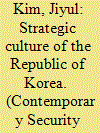

|
|
|
|
|
| Publication |
2014.
|
| Summary/Abstract |
The strategic culture of the Republic of Korea (ROK or South Korea) is based on three pillars: attaining prosperity and strength as an enduring national purpose and objective; countering the existential North Korean threat; and maintaining a strong alliance with the United States. This strategic culture is grounded in history, especially in Koreans' sense of themselves as an ancient and homogeneous people, the minjok, and in a constructed martial heritage. Keepers of strategic culture include the national security establishment, the National Assembly, the media, the public, and the United States, but the most important keeper is the president, who ultimately defines South Korea's strategic interests and how they should be attained or guarded. Contemporary illustrations of South Korean strategic culture in action include defence reform measures, shifts in the American alliance, and the 'crisis of 2013', which included a North Korean nuclear test and extreme threats of war. This article reinforces the view that while strategic culture may be a universal concept, in its operationalized and practised form, the true value of the concept is that the unique and particularistic characteristics that define each specific strategic cultural tradition are placed at the centre of analysis. South Korea's strategic culture is unique, but if there is an aspect that can be applied to other nations it is that shared historical memory and public historiography are crucial factors that inform that nation's strategic culture
|
|
|
|
|
|
|
|
|
|
|
|
|
|
|
|